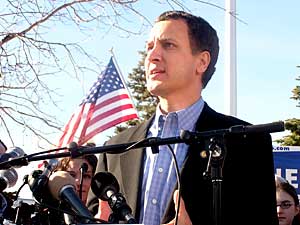Audio
Photos
| |||||||||||||||||||||||
 |
| Earlier this year, Rep. Mark Kennedy announced he's running for the U.S. Senate in his hometown of Watertown. (MPR file photo) |
St. Paul, Minn. — A coalition of unions and other groups called the Emergency Campaign for America's Priorities is targeting Rep. Mark Kennedy, along with Rep. Gil Gutknecht and Jim Ramstad and Sen. Norm Coleman. The coalition said the budget bill would cut social programs that many Minnesotans rely on.
Coleman voted against the bill in the Senate, and Ramstad said he'll vote against it because of the cuts. Gutknecht said he's leaning toward voting for the bill, but Kennedy remains undecided, according to his spokesperson. Kennedy declined requests for an interview for this story. When approached by a reporter working for MPR in Washington, Kennedy wouldn't comment.
"If you could just call my press person, I'd appreciate that," Kennedy told the reporter.
"For a Congressman to continue to avoid talking about it, I find that very troubling," said Donald McFarland, the Minnesota director of the Emergency Campaign for America's Priorities.
McFarland said ECAP has been mobilizing Minnesotans to contact Kennedy and the other Minnesota Republicans. McFarland said he thinks the vote is an important one for Kennedy because he's running for Senate.
"I hope he's very much considering what this bill means to Minnesotans," McFarland said. "As a U.S. senator, he would represent every Minnesotan."
State officials said nearly 500,000 Minnesotans are on Medicaid, and nearly 250,000 people receive food stamps. More than 150,000 Minnesota students get federal student aid, and some of them have held news conferences around the state to voice opposition to the budget bill.
Pollster Bill Morris says if Kennedy votes to cut those programs, it could haunt him in his Senate bid.
"A 'yes' vote is going to anger part of the key constituency, those suburban swing voters in the middle and upper-middle classes," Morris said.
Morris' firm conducted a poll for the National Wildlife Federation on an environmental topic earlier this fall. The poll also included some budget questions, and found that most of the 625 voters surveyed opposed some of the proposed spending cuts. Eighty-five percent opposed Medicaid cuts, and more than three-quarters opposed cuts to student loan programs.
The situation leaves Kennedy caught between important constituencies. Morris said Kennedy may be getting pressure from affected Minnesotans to oppose the cuts, but he's also under pressure from House Republican leaders and President Bush to vote for the bill. Kennedy has consistently voted with the president on budget issues, and Bush is coming to Minnesota next month to raise money for Kennedy's Senate campaign.
Kennedy is a fiscal conservative who has talked about the need to reduce the federal budget deficit and cut taxes to spur economic growth. So has 1st District Rep. Gil Gutknecht, who said he worries the bill doesn't do enough to reduce the federal deficit.
"This is not Monopoly money and we have a moral obligation to do a better job of balancing the federal budget than we've done over the last four or five years," Gutknecht said. "So these things are never easy, but I think it's the right thing to do."
Gutknecht acknowledged he's getting calls from constituents concerned about the spending cuts in the bill. But he said most voters he talks to want the federal government to control spending. He said the budget bill merely reduces the rate of growth in government spending, and notes that entitlement spending will still increase 5.6 percent under the GOP bill.






